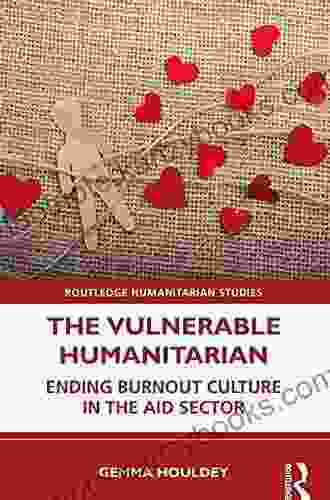Transforming the Aid Sector: Ending the Cycle of Burnout

5 out of 5
| Language | : | English |
| File size | : | 1324 KB |
| Text-to-Speech | : | Enabled |
| Screen Reader | : | Supported |
| Enhanced typesetting | : | Enabled |
| Print length | : | 195 pages |
The aid sector, driven by the noble mission of alleviating human suffering, has long grappled with a systemic issue: burnout. The relentless demands, emotional toll, and challenging work environments have pushed aid workers to their breaking point, leading to widespread burnout and its detrimental consequences.
However, a beacon of hope has emerged in the form of Ending Burnout Culture In The Aid Sector Routledge Humanitarian Studies. This groundbreaking book, meticulously researched and authored by leading experts, offers a comprehensive roadmap for transforming the aid sector into a sustainable and thriving work environment.
Understanding Burnout Culture
Burnout is a state of emotional, physical, and mental exhaustion caused by prolonged stress and overwhelming workload. In the aid sector, the unique challenges of working in crisis-ridden areas, witnessing trauma, and managing limited resources can exacerbate burnout.
Ending Burnout Culture In The Aid Sector delves into the underlying causes of burnout, including:
- Excessive workload and unrealistic expectations: The humanitarian imperative to respond to crises often leads to overwhelming workloads and unrealistic deadlines.
- Lack of control and decision-making power: Aid workers may feel disempowered in their ability to influence decision-making processes, leading to a sense of frustration and helplessness.
- Emotional toll: Witnessing and responding to human suffering can take a significant toll on the emotional well-being of aid workers.
- Organizational culture: Rigid hierarchies, lack of transparency, and a culture of silence can contribute to burnout.
The Devastating Consequences of Burnout
Burnout is not merely a personal issue; it has far-reaching consequences for the aid sector. It leads to:
- Reduced productivity and efficiency: Burned-out aid workers are less effective and productive, hindering the sector's ability to deliver aid.
- Increased staff turnover: Burnout can lead to a high rate of staff turnover, weakening the sector's institutional knowledge and continuity.
- Compromised aid quality: Burnout can impair aid workers' judgment and decision-making, potentially affecting the quality of assistance provided.
- Damage to reputation: A reputation for high burnout can deter potential donors and partners, undermining the sector's credibility.
Transforming the Aid Sector: A Comprehensive Approach
Ending Burnout Culture In The Aid Sector proposes a multi-pronged approach to addressing burnout and creating a sustainable work environment. The book outlines:
Self-Care and Well-Being
The book emphasizes the importance of self-care and well-being practices for aid workers, including:
- Setting boundaries and managing workload
- Engaging in self-reflection and seeking support
- Practicing meditation and mindfulness
- Taking time for rest and relaxation
Organizational Change
The book advocates for organizational changes to create a supportive and less stressful work environment. Recommendations include:
- Improving communication and transparency
- Empowering aid workers with decision-making authority
- Promoting a culture of open dialogue and support
- Investing in resources for staff well-being, such as counseling services
Sector-Wide Cooperation
The book recognizes that ending burnout requires collaboration and collective action. It calls for:
- Establishing a sector-wide task force to address burnout
- Sharing best practices and resources for well-being
- Raising awareness about burnout and its impact
- Advocating for policies and funding to support staff well-being
Ending Burnout Culture In The Aid Sector Routledge Humanitarian Studies is a game-changer for the aid sector. Its comprehensive approach offers a roadmap for transformative change, addressing the root causes of burnout and empowering aid workers to thrive in their critical work.
By embracing the insights and solutions presented in this book, the aid sector has the potential to create a sustainable and flourishing work environment where aid workers can deliver aid effectively while preserving their well-being.
Together, let us end the cycle of burnout and build a sector that empowers aid workers to make a lasting impact on the world, without sacrificing their own health and happiness.
5 out of 5
| Language | : | English |
| File size | : | 1324 KB |
| Text-to-Speech | : | Enabled |
| Screen Reader | : | Supported |
| Enhanced typesetting | : | Enabled |
| Print length | : | 195 pages |
Do you want to contribute by writing guest posts on this blog?
Please contact us and send us a resume of previous articles that you have written.
 Book
Book Novel
Novel Page
Page Chapter
Chapter Text
Text Story
Story Genre
Genre Reader
Reader Library
Library Paperback
Paperback E-book
E-book Magazine
Magazine Newspaper
Newspaper Paragraph
Paragraph Sentence
Sentence Bookmark
Bookmark Shelf
Shelf Glossary
Glossary Bibliography
Bibliography Foreword
Foreword Preface
Preface Synopsis
Synopsis Annotation
Annotation Footnote
Footnote Manuscript
Manuscript Scroll
Scroll Codex
Codex Tome
Tome Bestseller
Bestseller Classics
Classics Library card
Library card Narrative
Narrative Biography
Biography Autobiography
Autobiography Memoir
Memoir Reference
Reference Encyclopedia
Encyclopedia Kathy Abernethy
Kathy Abernethy Fritz Springmeier
Fritz Springmeier Gerald Knight
Gerald Knight Jimmy Wayne
Jimmy Wayne Gary Allen
Gary Allen Inda Schaenen
Inda Schaenen Victoria Gallagher
Victoria Gallagher Garth Ravenhill
Garth Ravenhill Juliette Duncan
Juliette Duncan Lauryn Colatuno
Lauryn Colatuno General
General Mandy Kirkby
Mandy Kirkby Martinus C De Boer
Martinus C De Boer Gail Weatherill Rn Caed
Gail Weatherill Rn Caed Jordan Krause
Jordan Krause Gelett Burgess
Gelett Burgess Scott Daley
Scott Daley Fulton J Sheen
Fulton J Sheen Lacey Dunn
Lacey Dunn Jane Plant
Jane Plant
Light bulbAdvertise smarter! Our strategic ad space ensures maximum exposure. Reserve your spot today!

 Dawson ReedKeto If Exercise Healthy Lean Fit: The Ultimate Guide to a Healthier, Leaner...
Dawson ReedKeto If Exercise Healthy Lean Fit: The Ultimate Guide to a Healthier, Leaner...
 Edison MitchellA Culinary Tour of Central America: A Taste of Diverse Flavors and Traditions
Edison MitchellA Culinary Tour of Central America: A Taste of Diverse Flavors and Traditions Sean TurnerFollow ·6.9k
Sean TurnerFollow ·6.9k Eric NelsonFollow ·10.8k
Eric NelsonFollow ·10.8k Hector BlairFollow ·12.1k
Hector BlairFollow ·12.1k Cameron ReedFollow ·3.3k
Cameron ReedFollow ·3.3k Gary CoxFollow ·16.9k
Gary CoxFollow ·16.9k Haruki MurakamiFollow ·12.6k
Haruki MurakamiFollow ·12.6k Andres CarterFollow ·6.8k
Andres CarterFollow ·6.8k Everett BellFollow ·10k
Everett BellFollow ·10k

 Herman Mitchell
Herman MitchellUnraveling the Enigmas of "The Naked Sun": A Journey into...
In the vast tapestry of science...

 Seth Hayes
Seth HayesPoseurkids: Making Sense of the Labyrinth of Youth
Welcome to the enigmatic realm of...

 Robbie Carter
Robbie CarterUnlock the Power of EFT Tapping: Overcome Feelings of...
Anxiety and feelings of inferiority can be...

 Darnell Mitchell
Darnell MitchellThe Robots of Dawn: Unraveling the Enigma of Humanity and...
Stepping into Asimov's...
5 out of 5
| Language | : | English |
| File size | : | 1324 KB |
| Text-to-Speech | : | Enabled |
| Screen Reader | : | Supported |
| Enhanced typesetting | : | Enabled |
| Print length | : | 195 pages |












